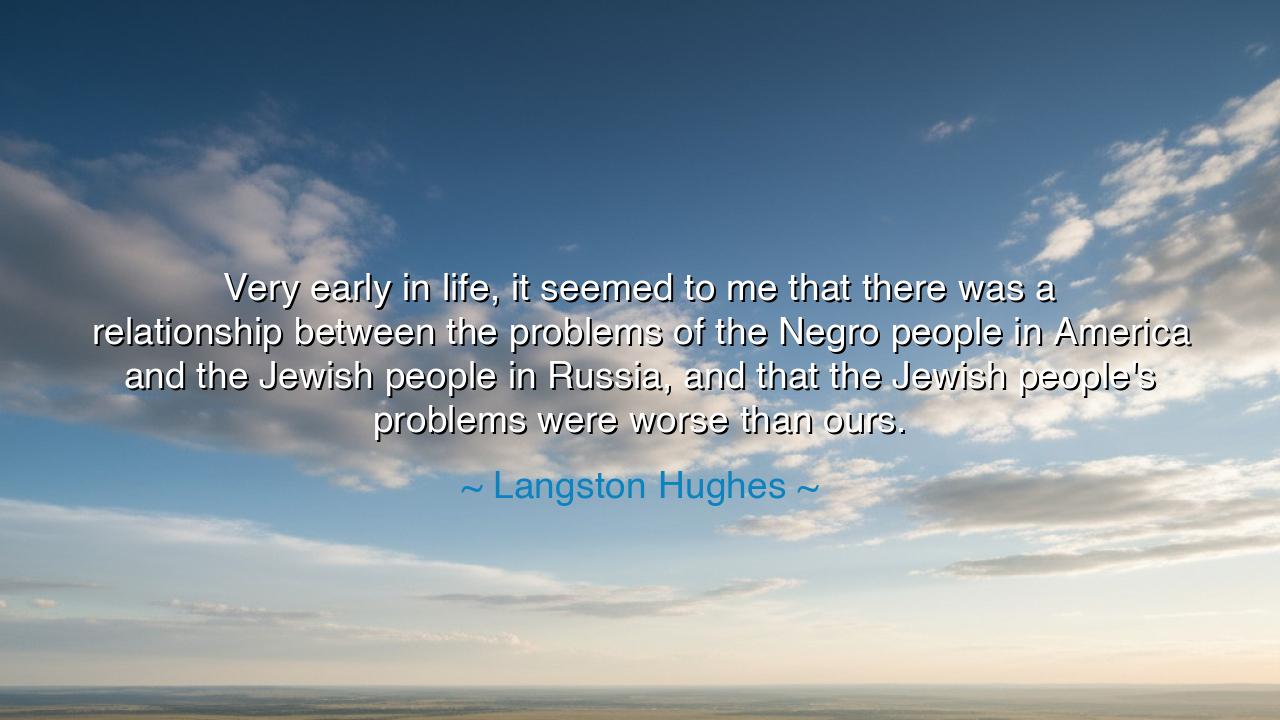
Very early in life, it seemed to me that there was a
Very early in life, it seemed to me that there was a relationship between the problems of the Negro people in America and the Jewish people in Russia, and that the Jewish people's problems were worse than ours.






In the scrolls of history, the cries of the oppressed echo through the ages, each voice carrying the weight of suffering and the hope of deliverance. Langston Hughes, a poet whose heart beat with the rhythms of his people, beheld this truth in his youth. He saw the plight of the Negro people in America, bound by chains both visible and unseen, and his soul stirred with sorrow and defiance. Yet, in his wanderings and studies, he discerned another tale of woe — the sorrows of the Jewish people in Russia, whose torment pierced even deeper into the marrow of existence.
From this vision arose a sacred understanding: that though the forms of oppression differ, their roots are entwined. Hughes perceived a relationship between these struggles, a dark thread woven through distant lands, binding the victims of hatred and tyranny. His revelation was not to diminish his own people’s pain, but to widen the circle of compassion, to see beyond the narrow borders of nation and skin. In recognizing that another’s burden may be even heavier, he revealed the humility and wisdom of a soul attuned to universal suffering.
This insight was born in an age of turmoil, when the Negro people faced the lash of segregation and the cruel weight of systemic injustice. Across the seas, the Jewish people endured pogroms, exile, and the relentless assault of prejudice. Hughes’ words serve as a bridge between these worlds, reminding us that while pain wears many faces, its essence is the same. The oppressed are kin, joined not by blood, but by the shared yearning for freedom.
Let this teaching be a torch for future generations: to see beyond the walls of one’s own struggle, and to stand in solidarity with all who suffer. For when we recognize the relationships between our pains, we weaken the chains of hatred. In the heart of every just soul must dwell the truth that justice for one is bound to justice for all. Thus, the wisdom of Hughes endures, a beacon of empathy amid the storms of history.






HNha nguyen
Langston Hughes often used his voice to shed light on the injustice faced by African Americans, yet in this quote, he acknowledges the suffering of Jews in Russia. Do you think his recognition of shared pain can be a call for greater empathy among oppressed communities? Can understanding and solidarity between marginalized groups help address broader societal inequalities?
UGUser Google
Langston Hughes brings an interesting perspective on the history of oppression by comparing the struggles of African Americans and Jews. The idea that one group’s suffering may have seemed 'worse' than another’s is a complex thought. What does this comparison say about the way we understand suffering and victimhood in history? Can we truly compare the pain of different communities, or does that diminish the uniqueness of each struggle?
NTanh kim nguyen thi
This quote by Langston Hughes offers a powerful reflection on how different communities experience suffering in different ways. He highlights that, while the struggles of African Americans were immense, they were not the only ones facing oppression. Do you think recognizing these similarities between marginalized groups can foster solidarity, or does it risk minimizing individual struggles?
GNLe Gia Nhu
Hughes’ perspective on the suffering of both the African American and Jewish communities shows a deep understanding of shared human struggles. How do you think his comparison of suffering between these two groups might influence how we view issues of race and persecution in the present day? Are there parallels we can draw from history to address modern injustices?
MHMinh Hai
Langston Hughes' reflection on the shared struggles of marginalized groups is striking. It’s fascinating how he saw parallels between the plight of African Americans and Jews, even as a young person. What do you think Hughes was trying to convey about the universal nature of oppression, and how do these historical comparisons shape our understanding of injustice today?